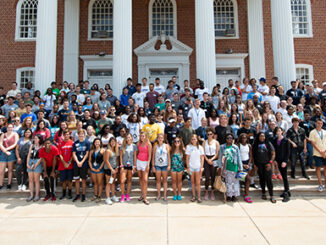
By Amanda Smith//
With the recent surge in transphobic rhetoric in the United States, Hood’s increasingly diverse student body is attempting to uplift the transgender and nonbinary community through policy implementation and events.
In many states across the U.S., there has been an increase in transphobic legislation, one of most well-known cases being the Tennessee law that restricts drag performances in public spaces. Florida also recently advanced a bill that would ban gender-affirming care and strip parental rights from parents who support their transgender children.
In fact, in the past three months, 10 Republican-led states have passed laws banning gender-affirming care for young people. For those under the age of 18, these laws prohibit or severely restrict the use of puberty blockers, cross-sex hormones and transition surgery.
Lisa Marcus, chair of the President’s Council on Transgender Inclusivity, said Hood has been actively working to become more trans-friendly in its policies.
“We’re fortunate at Hood that we’re not in a state that is actively doing those things,” Marcus said. Marcus started the President’s Council on Transgender Inclusivity about six years ago because she saw a need to help uplift and affirm Hood’s transgender students.
“I’ve been working with this group of people from all different departments for years to try and affirm our trans students any way we can,” Marcus said. “The types of things that we try to do are host events that will make transgender issues more visible on campus.”
The Queer Student Union (QSU) also plays a large part in organizing events to uplift LGBTQ+ students on campus.
“We recently did a bras and binders event for Trans Day of Visibility,” said Anna Leplatt, president of the QSU. “We talked about the access that a lot of trans youth especially don’t have to these options. There are a lot of trans women who have access to bras, and a lot of trans men who don’t have access to binders.”
The club hosts weekly events with the goal of promoting unity amongst LGBTQ+ students on campus. There is also no public documentation of anyone who attends these events due to safety and privacy reasons, Leplatt said.
According to Marcus, along with events that affirm student identities, policy implementation also plays a huge role in transgender inclusivity on campus.
“We have implemented a name change policy at Hood that we didn’t have just three years ago where students can go into their Self Service profile and change their name at any time,” Marcus said. “And it does not have to be a legal name change, it’s their chosen name. That name is then supposed to show up on all course rosters, you can get an ID with that name without extra charge.”
Hood also works to ensure that its facilities, including restrooms and dormitories, are inclusive for transgender students.
“We have all gender restrooms located throughout campus,” said Tammi Simpson, vice president of Community and Inclusivity. “The Office of Residence Life works to ensure that residence halls are inclusive for all students, including transgender students. For example, Residence Life offers flexible housing and roommate matching for LGBTQ+ students.”
Additionally, Hood offers workshops to educate faculty and staff about the experiences and needs of transgender and nonbinary students on campus.
“We provide information about trans inclusive practices through email to the Hood Community, programming throughout the year, and continuing education for faculty and staff,” Simpson said. The most recent workshop for faculty and staff focused on trans friendly practices on campus.
Education on transgender issues and experiences plays a significant role in cultivating an inclusive environment on campus.
“I think it would be helpful for students who are not part of that community to learn on their own, to make the effort to go out and learn rather than asking their trans or nonbinary friends to educate them all the time,” Marcus said. “That’s a real burden on trans and nonbinary folks, to be the educator all the time.”
Leplatt also stated that next year they want the QSU to organize more education events promoting advocacy and building community. “On campus right now, I know that we do have a larger queer community than a lot of other colleges in this area,” Leplatt said. “Hood itself is doing a good job making sure that people feel included, as well as amplifying those voices.”
“As a nonbinary student at Hood, I feel safe and comfortable expressing who I am,” said sophomore Alex Kowalski. “The staff, students, and faculty on campus make me feel even safer because they respect my pronouns as well as my chosen name.”
“My experience on campus has been mixed,” said a transgender student who wished to remain anonymous. “From the start, staff seemed as if they were only acting supportive, while not actually taking action.”
The student was placed in a residence hall on a floor with primarily other transgender and LGBTQ+ students.
“There are 15 students on my floor; nine of them are transgender or nonbinary, and 12 of them are otherwise LGBT,” he said. “This is unacceptable and in my opinion, very clearly discrimination. I know another transgender student whose transgender status was disclosed without consent to their roommate by ResLife. Situations like this are inappropriate and put vulnerable students in danger.”
The student also shared concerns regarding Hood’s staff and faculty not being properly trained on trans inclusive practices. “I have a professor who made her students write name tags with “preferred names and pronouns” on them the first day,” he said. “Despite that, she’s constantly showing her attendance on the projector, where students’ deadnames can be visible. She also often misgenders students but pretends she does not and dismisses it when we point it out to her.”
“Despite that, I’ve had good experiences as well,” he added. “Toll House was very inclusive and respectful of how being transgender affects my medical visits.”
“I definitely feel supported by staff and faculty,” said a nonbinary instructor at Hood who wished to remain anonymous. “My colleagues and supervisors are unfailingly kind, understanding, and respectful. They genuinely care about being inclusive and have never complained about the use of singular ‘they’ pronouns as being confusing.”
“I do think that Hood is trying to be inclusive,” said the instructor. “Listening to the experiences of my students, my impression is that many of their complaints have to do with a lack of spaces and events specifically for trans, nonbinary, and gender-nonconforming folks.”
“I don’t think we’re ever doing enough,” Marcus said in regard to transgender inclusivity on campus. “I think I would answer that way no matter what we were doing. It’s something that could always be improved.”




Be the first to comment